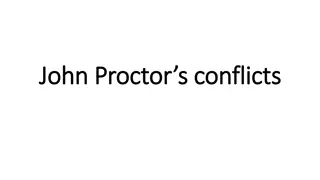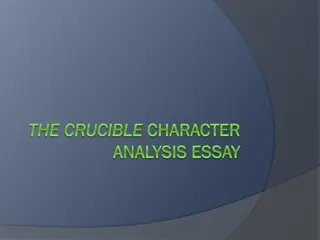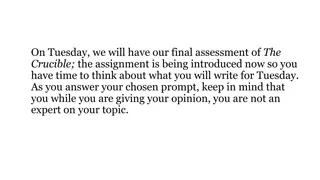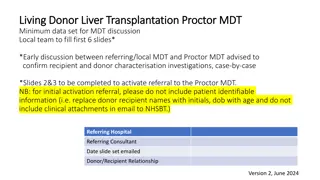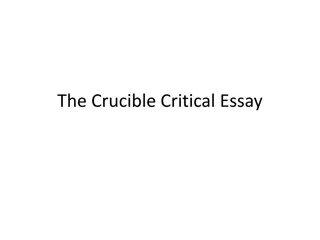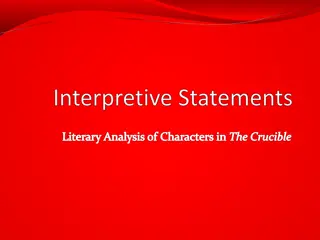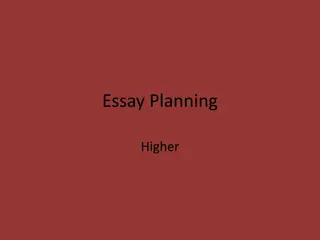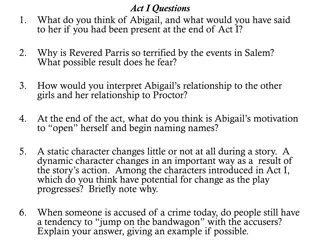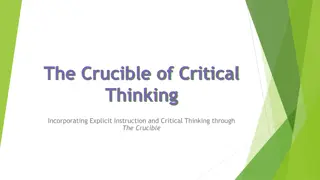Character Development in "The Crucible": Analyzing Elizabeth Proctor's Transformation
Dive into the impactful scene changes in the play "The Crucible" where character dynamics shift, focusing on Elizabeth Proctor's evolution and her pivotal moments with John Proctor. Explore her journey from distrust to forgiveness and examine the significance of these transitions in shaping the narrative.
Download Presentation

Please find below an Image/Link to download the presentation.
The content on the website is provided AS IS for your information and personal use only. It may not be sold, licensed, or shared on other websites without obtaining consent from the author.If you encounter any issues during the download, it is possible that the publisher has removed the file from their server.
You are allowed to download the files provided on this website for personal or commercial use, subject to the condition that they are used lawfully. All files are the property of their respective owners.
The content on the website is provided AS IS for your information and personal use only. It may not be sold, licensed, or shared on other websites without obtaining consent from the author.
E N D
Presentation Transcript
Higher Crucible Critical Essay In-depth plan with exemplars
Drama to complete: TASK: Choose from a play a scene which significantly changes your view of a character. Explain how the scene prompts this reappraisal and discuss how important it is to your understanding of the character in the play as a whole. You should be able to split the question into 2
The first part allows you to choose what your essay will be about The second part allows you to show off your understanding of the play! For this question I m going to focus on the character who I believe changes in a certain scene: Elizabeth Proctor.
Ask yourself What is the most sensible approach for this question? Asked about when and HOW Elizabeth CHANGES I need to show understanding of what she was like BEFORE and AFTER So I know that in my plan I can have a simple 1. Act 2 Eliz 2. Act 3 Eliz 3. Act 4 Eliz Most of my points will be about her relationship with John showing an understanding of how she has changed
Introduction You know the key points expected of you in an intro As the question is focusing on a scene where a character changes I must give an indication in my intro what that scene is and who I will be discussing.
Example 1 Arthur Miller s The Crucible is a play in which there are many complex and developed relationships, an important one being between the central character John Proctor and his wife, Elizabeth. The play follows the Salem witch trials in 1692 where a group of young girls become hysterical and accuse many people in the town of making compacts with the devil. A select few see the trials as what they really are: corruption and lies snowballing out of control. The Proctor s relationship develops throughout the play as the audience are aware of the thaw of Elizabeth s distrust towards John following his affair with Abigail Williams. Miller uses the turning point in the court scene in Act 3 to highlight Elizabeth s change from being cold and unwilling to trust her husband to understanding his nature and forgiving him. Her love for her husband is most clearly seen as she attempts to save his reputation within the town.
Example 2 The Crucible written by Arthur Miller is an interesting play based on the Salem witch trials of 1692. Miller conveys his themes of judgement and reputation through the central character s relationship with his wife Elizabeth. As Proctor had confessed to an affair with Abigail Williams, who continued the witch trials with the motive of replacing Elizabeth at John s side, the Proctors relationship has been strained. The audience are aware of Elizabeth s changing character as although she has difficulty trusting her husband when we first see them together it is clear from the court scene in Act 3 that she loves him and wants to save his reputation within their community rather than save herself.
Which is better? Why? Read through the two choices (I am not saying that either is perfect ) and decide which you like best and why. What would you do to IMPROVE the introduction you have chosen?
To discuss Two introductions taken from class jotters Both are very good but very different what do you think?
Pupil A The Crucible , a play by Arthur Miller, deals with the themes of reputation and corruption through his dramatisation of the Salem witch trials in 1692. The protagonist, John Proctor, commits adultery with his then maid, Abigail Williams. This makes his relationship with Elizabeth, his wife, strained as she judges and mistrusts him. In the court scene in Act 3, however, she lies to protect his reputation. This causes the audience to realise Elizabeth does love him and wants to support him. Her change from coldness and mistrust to forgiveness shows she is a loyal wife who can forgive and support her husband.
Pupil B Arthur Miller s The Crucible , based on the 1692 Salem witch trials, contains many complex characters. Elizabeth Proctor, the protagonist s wife, is one such character. The audience s first encounter with Elizabeth shows she does not trust John following his affair with Abigail Williams, but the court scene in Act 3 reveals her to be a loving, loyal wife who s greatest aim is to uphold her husband s reputation.
Main issues with class introductions 1. Too vague a lot of statements that were not entirely relevant to task. Your introduction is to tell your marker what your essay is going to be about and to show that you understand HOW you are going to answer. 2. Theme is not a technique. Theme does not show me anything. Techniques show the theme. Relationships highlight the theme. Do not confuse this.
Technical accuracy Basic spelling words that were on the sheet in front of you? Sentencing Making sense?? At this stage you should be able to write in sentences. Some of you cannot. You need to practise English is a skills based subject and skills need to be practised.
Para 1 Topic sentence (task based!!) (task + focus of the paragraph) Eg. Prior to the courtroom scene Elizabeth Proctor is seen by the audience as a cold and withdrawn woman. I am mentioning the task in here but I am also showing the FOCUS of this paragraph what she was like BEFORE the scene.
Integrating quotations effectively Main ways of laying out quotations? Rule of thumb? Embedded Stand-alone What are the different rules for each?
Embedded quotations When you are able, you should use an embedded quotation in preference to the stand-alone quotation. The quotation must be short and fit in with the grammar of the sentence. Example: By calling her lover beloved sweetheart bastard , Havisham gives the reader the impression that she retains an ambivalent attitude towards him. The quotation is SHORT and fits grammatically into the sentence.
Stand-alone quotations This is used where the quotation will not fit grammatically into the sentence. The quotation should be written in a paragraph of its own, indented on both left and right-hand sides. I look for John Proctor that took me from my sleep and put knowledge in my heart! If it is stand-alone quotation marks are not needed (do not panic if you cannot help yourself and have to put them in you will not be penalised)
Analysing evidence Analysing evidence in drama and prose is very different to poetry. In poetry you are allowed to micro-analyse actual words and language devices but in drama and prose you have to explain how the quotation helps make your point.
For example I look for John Proctor that took me from my sleep and put knowledge in my heart! Abigail s use of the personal pronoun shows that she is a selfish character who is only interested in the power she has achieved by denouncing innocent citizens of Salem. The word choice of knowledge effectively conveys her opinion that Proctor has increased her prospects as she is now aware of how the world really works.
When you are reading this analysis what question do you think this might be trying to answer? I look for John Proctor that took me from my sleep and put knowledge in my heart! In Abigail s desperate attempt to remind Proctor of their relationship she manages to achieve the opposite of her intention and angers the man she loves. Her rationalisation for John s distance is that his cold, snivelling wife has poisoned Abigail s name instead of understanding his own guilt ridden reasons. John s internal conflict is obvious as although he thinks kindly on the memory of Abigail, he wants to be faithful to his wife and be the good man that he is expected to be.
When thinking about setting out your paragraph Topic sentence DONE What do you want to say? Brief context + quote. What does this quote show us? Why have you mentioned it? How does it help demonstrate your point?
Main points to focus on in paragraph 1? Elizabeth s relationship with John at start of Act 2. How I know this? QUOTE to support Why the relationship is in this state? Quote to support? Explain what this shows us about her? What is my opinion of Elizabeth as we lead up to her being accused of witchcraft in Act 2 why is this? Remember you want Act 3 to be the turn-around scene so you should make some negative statements about the Proctors relationship at this stage.
For example Prior to the courtroom scene Elizabeth Proctor is seen by the audience as a cold and withdrawn woman. At the start of Act 2 the result of John s affair is seen as he is still convincing his wife the he mean[s] to please [her] Miller s stage directions imply the distance that exists between the couple: He gets up, goes to her, kisses her. She receives it. Miller instructions show John trying to close the gap between himself and Elizabeth implying that all effort to heal the rift comes from John. Elizabeth s passive response shows she does not offer any encouragement. Miller continues to portray their uneasy relationship as he suggests John does not feel good enough for his wife and her high ideals. Following an argument about John s adultery Elizabeth tries to appease her husband remarking I do not judge you however John s bitter response suggests that the opposite is true. To finish this paragraph how do I feel about Eliz as she is accused of witchcraft? Why do I feel this way?
As you can see my version of paragraph one is NOT heavy on techniques however through my descriptions I am covering: Characterisation Conflict Theme Staging
To maintain my clear structure I will now look into the key scene that changes my view of Elizabeth. If you read the question again you need to ensure you are discussing the importance of this change! For me, it is important that she changes to show how she really feels about her husband therefore making her an admirable character.
Paragraph 2 Topic sentence: Miller surprises his audience in Act 3 when Elizabeth lies to the court in order to save her husband. REMEMBER my task is to say how the scene changes the audience s view of a character and how important this is to the whole play.
Where do we go from here? Building tension HOW? Expectation from what we know of Elizabeth s characterisation so far? Stage directions building tension in the audience? WHY does she do it? What does this show about her character? The relationship? How does this link to the themes? How can it be seen as admirable yet disappointing?
Final paragraph Keeping us on task I ve written about BEFORE the scene and DURING the scene how my opinion of Elizabeth has altered. Now I need to address the next part of the task how important is this in my understanding of the play as a whole? I think it would be wrong to write an essay on Elizabeth s softer side and not discuss Act 4.
Act 4 Why John committed lechery why does she admit this? Their relationship now? As a result of the turning point? Why she utters that final line? How does this add to your understanding of the character in the play? Why is she there? Try to weave your central concerns in here importance of reputation etc.
Conclusion You know what to do here. If I can give one point of support it would be to ensure that you are answering BOTH parts of the task that you identified at the start!






